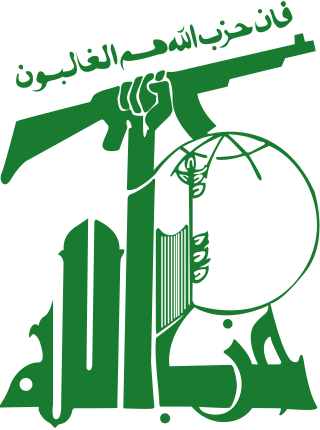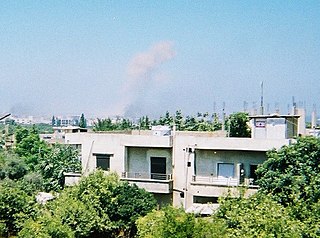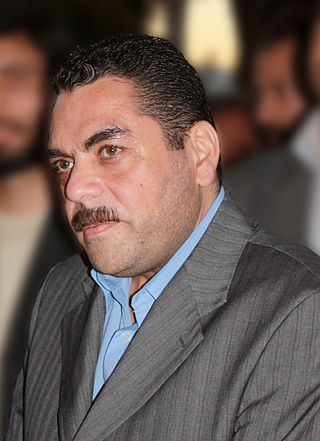Related Research Articles

Hezbollah is a Lebanese Shia Islamist political party and paramilitary group. Hezbollah's paramilitary wing is the Jihad Council, and its political wing is the Loyalty to the Resistance Bloc party in the Lebanese Parliament. Its armed strength was assessed to be equivalent to that of a medium-sized army in 2016.

Hassan Nasrallah was a Lebanese cleric and politician who served as the third secretary-general of Hezbollah, a Shia Islamist political party and militia, from 1992 until his assassination in 2024.

Imad Fayez Mughniyeh, also known by his nom de guerre al-Hajj Radwan, was a Lebanese militant leader who was the founding member of Lebanon's Islamic Jihad Organization and number two in Hezbollah's leadership. Information about Mughniyeh is limited, but he is believed to have been Hezbollah's chief of staff and understood to have overseen Hezbollah's military, intelligence, and security apparatuses. He was one of the main founders of Hezbollah in the 1980s, and was described as a skilled military tactician and highly elusive figure. He was often referred to as an ‘untraceable ghost’.
Al-Manar is a Lebanese satellite television station owned and operated by the Islamist political party and paramilitary group Hezbollah, broadcasting from Beirut, Lebanon. The channel was launched on 4 June 1991 as a terrestrial channel and in 2000 as a satellite channel. It is a member of the Arab States Broadcasting Union. The station reaches around 50 million people.

Dahieh is a predominantly Shia Muslim suburb in the south of Beirut, in the Baabda District of Lebanon. It has a minority of Sunni Muslims, Christians, and a Palestinian refugee camp with 20,000 inhabitants. It is a residential and commercial area with malls, stores and souks, and comprises several towns and municipalities, including Ghobeiry, Haret Hreik, Bourj el-Barajneh, Ouzai, and Hay El-Saloum. It is north of Rafic Hariri International Airport, and the M51 freeway that links Beirut to the airport passes through it.
Al Akhbar is a daily Arabic language newspaper published in a semi tabloid format in Beirut. The newspaper's writers have included Ibrahim Al Amine, As'ad AbuKhalil, Amal Saad-Ghorayeb, Sharmine Narwani, Pierre Abi Saab, and Amer Mohsen. Until 2015, it also had an English version published on the Internet. It is pro-Hezbollah and pro-Syrian regime, and in general opposes Saudi Arabia, the United States, the Future Movement, and the March 14 Alliance.

Hezbollah, a Shia Islamist political and militant group based in Lebanon, is driven by an ideology that combines religious, political, and social elements. Founded in the early 1980s, Hezbollah's ideology is deeply rooted in Shia Islam and influenced by the Iranian Revolution. Central to its ideology is opposition to Western influence and Israeli occupation, which it frames as a struggle for justice and liberation, while also positioning Islam as a comprehensive solution to social and political issues. Hezbollah's ideological framework is articulated through its foundational documents, such as the 1985 "Open Letter" and the 2009 "New Manifesto," which emphasize themes of anti-Zionism, anti-Americanism, and the establishment of an Islamic state governed by Sharia. The movement also advocates for pan-Islamism and pan-Arabism, promoting unity among Muslims and Arabs while supporting Iran as a model of sovereignty.
Along with the Amal Movement, Hezbollah is one of the two main parties representing the Shia community, Lebanon's largest religious bloc. Amal has made a commitment to carrying out its activities through political means, but remains a partial fighting force aiding Hezbollah when the need arises.
Hezbollah has a military branch and is the sponsor of a number of lesser-known groups, some of which may be little more than fronts for Hezbollah itself. These groups include the Organization of the Oppressed, the Revolutionary Justice Organization, the Organization of Right Against Wrong, and Followers of the Prophet Muhammad.

The 2006–2008 Lebanese protests were a series of political protests and sit-ins in Lebanon that began on 1 December 2006, led by groups that opposed the US and Saudi-backed government of Prime Minister Fouad Siniora and ended on 21 May 2008 with the signing of the Doha Agreement. The opposition was made up of Hezbollah, Amal, and the Free Patriotic Movement (FPM); a number of smaller parties were also involved, including the Marada party, the Lebanese Communist Party and the Syrian Social Nationalist Party. A majority of the members of the government were part of the anti-Syrian March 14 Alliance, a coalition of political parties and independents in Lebanon. The two groups were also divided along religious lines, with most Sunnis and Druze supporting the government, and most Shi'a supporting the opposition. The Christian community was split between the two factions, with Michel Aoun, the leader of the FPM, claiming to have more than 70% support among the Christians, based on the results of the 2005 parliamentary election.

Subhi al-Tufayli is a Lebanese senior Shi'ite cleric and politician who helped found Hezbollah in 1982 and served as its first secretary-general from 1989 until 1991. From a comparatively young age, Tufayli achieved popular following amongst Lebanese Shi'ite community, who viewed him as the most learned Shi'ite scholar in the Beqaa Valley.

The 2007 Lebanon conflict began when fighting broke out between Fatah al-Islam, an Islamist militant organization, and the Lebanese Armed Forces (LAF) on May 20, 2007 in Nahr al-Bared, a UNRWA Palestinian refugee camp near Tripoli.
Alaa Zalzali is a Lebanese singer.

Samir Kuntar was a Lebanese Druze member of the Palestine Liberation Front. In 1979, he took part in the Nahariya attack in Israel, for which an Israeli court would convict him of murder and terrorism. Kantar denied the accusations and maintained his innocence. He was eventually released as part of the 2008 Israel–Hezbollah prisoner exchange.
The 2009 Hezbollah plot in Egypt involved the arrest of 49 men by Egyptian authorities in the five months preceding April 2009. Egypt accused them of being Hezbollah agents planning attacks against Israeli and Egyptian targets in the Sinai Peninsula. The arrests led to tensions between the Egyptian government and Hezbollah, as well as between Egypt and Iran.

Iran and Lebanon have diplomatic relations, with embassies in each other countries. Since the Iranian Revolution in 1979, the two countries have deepened relations amidst controversy in Lebanon and abroad.

Mustafa Badreddine was a Lebanese militant leader and both the cousin and brother-in-law of Imad Mughniyeh. He was nicknamed Dhu al-Fiqar referring to the legendary sword of Ali. His death was seen as one of the biggest blows in the Hezbollah leadership.
The January 2015 Mazraat Amal incident was an airstrike against a two-car convoy that killed six Hezbollah fighters, including two prominent commanders, and a general of the Iranian Revolutionary Guards (IRGC), Mohammad Ali Allahdadi, at al-Amal Farms in the Quneitra District of Syria, in the Eastern Golan Heights, on 18 January 2015, during the Syrian Civil War. The attack was largely attributed to Israel, which did not officially confirm that it carried it out. Hezbollah and IRGC held Israel responsible and threatened to retaliate. On 19 January 2015, Al-Nusra Front member Abu Azzam al-Idlibi claimed that Jihad Mughniyeh and the other Hezbollah fighters were killed in an Al-Nusra Front ambush at Jaroud in the Qalamoun Mountains in the Al-Qutayfah District northeast of Damascus, claiming that it "will be the end of the Persian project, God willing."

On 27 September 2024, Hassan Nasrallah, the secretary-general of Hezbollah, was assassinated in an Israeli airstrike in Beirut. The strike took place while Hezbollah leaders were meeting at a headquarters located 60 feet (18 m) underground beneath residential buildings in Haret Hreik in the Dahieh suburb to the south of Beirut. Conducted by the Israeli Air Force using F-15I fighters, the operation involved dropping more than 80 bombs, including US-made 2,000-pound (910 kg) bunker buster bombs, destroying the underground headquarters as well as nearby buildings. The Israel Defense Forces (IDF) codenamed the operation "New Order".
"Yalla Ya Nasrallah" is a satirical Israeli song that gained popularity during the 2006 Lebanon War. Written by Nadav Frishman & Assaf Frishman, it mocks Hezbollah leader Hassan Nasrallah with provocative lyrics. The song became a viral sensation across Israeli media during the 2006 conflict.